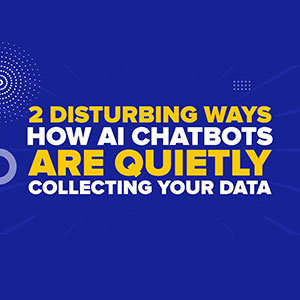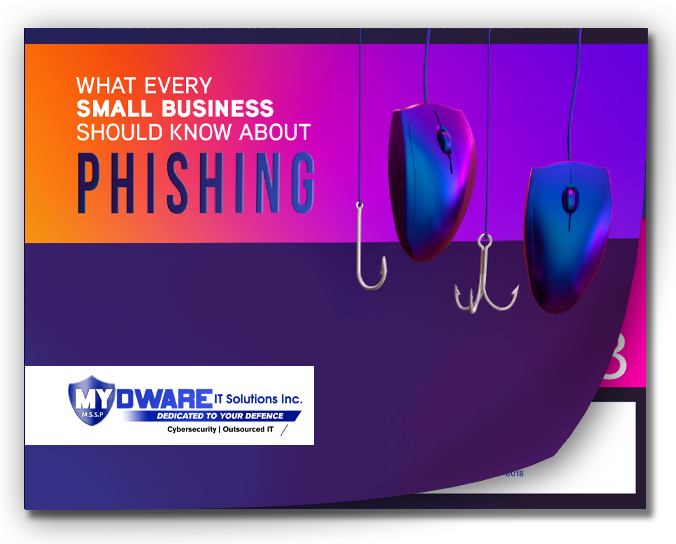 Chatbots like ChatGPT, Microsoft Copilot, and Google Gemini have made life easier, handling everything from drafting emails to generating full reports. But do you really know who—or what—is listening?
Chatbots like ChatGPT, Microsoft Copilot, and Google Gemini have made life easier, handling everything from drafting emails to generating full reports. But do you really know who—or what—is listening?
AI chatbots are always on, collecting, storing, and analyzing your conversations. Some even share data with third parties, raising serious privacy and cybersecurity concerns. If your business is using chatbots, you could be exposing sensitive information without even realizing it. Before you type another word, here’s what you need to know.
How Chatbots Are Quietly Collecting Your Data
AI chatbots don’t just “forget” your conversations after responding. Everything you type could be stored, analyzed, and even reviewed by humans.
1. What Chatbots Collect
Chatbots process and store various types of user data, including:
- Conversations: Every prompt and response may be logged.
- User Location: Many bots track where you’re accessing them from.
- Device Information: Some even collect data on the device and browser you’re using.
2. Where That Data Goes
Chatbots don’t all follow the same rules when handling your data. Here’s a look at some major platforms:
- ChatGPT: OpenAI logs prompts, device data, and usage history—and may share them with vendors and service providers.
- Microsoft Copilot: Collects browsing history, app interactions, and search data, which may be used to personalize ads.
- Google Gemini: Stores conversations for up to three years and humans may review your chats to improve AI accuracy.
- DeepSeek: The most invasive of the bunch, storing chat data, tracking typing patterns, and sending it to servers in China.
These platforms claim to prioritize privacy, but policies change—and you never really know where your data ends up.
Want to know how AI is being used by hackers to exploit SMBs? You should.
The Hidden Risks of AI Chatbots
Using AI-powered chatbots comes with serious risks—some of which could jeopardize your business security.
1. Data Privacy Risks
When you share sensitive information with AI chatbots, there’s no guarantee it won’t be accessed by third parties.
- Some chatbots allow human review of conversations, meaning real people could be reading your company’s private discussions.
- Stored data can be leaked in breaches—even ChatGPT experienced a security incident in 2023, exposing user chats.
2. AI-Powered Cyberattacks
Hackers are weaponizing AI chatbots to spread malware, steal credentials, and launch phishing scams.
- Microsoft Copilot was found to be vulnerable to exploitation, allowing attackers to manipulate AI-generated messages. (Wired, 2025)
- Some chatbots can generate highly sophisticated phishing emails, making scams harder to detect.
Think AI security is airtight? These 5 AI cybersecurity myths say otherwise.
3. Regulatory & Compliance Issues
If your business deals with customer data, financial records, or intellectual property, using unsecured chatbots could create compliance violations.
- GDPR and privacy laws restrict how businesses can store and process user data—but many AI chatbots don’t comply.
- Companies in finance, healthcare, and legal sectors could face heavy fines for mishandling sensitive information through chatbots.
Want to know how AI cyber threats are evolving faster than regulations? Here’s what’s coming next.
How to Keep Your Business Safe When Using AI Chatbots
AI chatbots aren’t going anywhere, so it’s up to you to protect your data.
1. Be Selective About What You Share
Never input confidential company data, passwords, or financial details into an AI chatbot.
2. Review Privacy Settings & Policies
- Opt out of data retention if the chatbot allows it.
- Check if the chatbot shares data with third parties—you might be giving away more than you think.
3. Implement AI-Safe Security Measures
- Use data loss prevention (DLP) tools to prevent sensitive info from being shared in chatbots.
- Set employee guidelines on which AI tools are approved for business use.
4. Train Your Team to Spot AI-Generated Threats
Cybercriminals are using AI to create scams that look legitimate—make sure your employees can tell the difference.
- AI-powered phishing attacks are 68% more effective than traditional scams. (Cybersecurity Canada, 2025)
- Train staff to recognize suspicious AI-generated emails, messages, and chatbot responses.
Are AI Chatbots Helping Your Business—Or Exposing It?
AI chatbots can be powerful business tools, but only if used responsibly. If you’re not careful, they can become a major security risk. Hackers, regulators, and AI companies are all watching—so should you.
Start with a FREE Cybersecurity Risk Assessment to uncover potential threats and protect your company’s data.
Darryl Cresswell
CEO & President
MYDWARE IT Solutions Inc.




